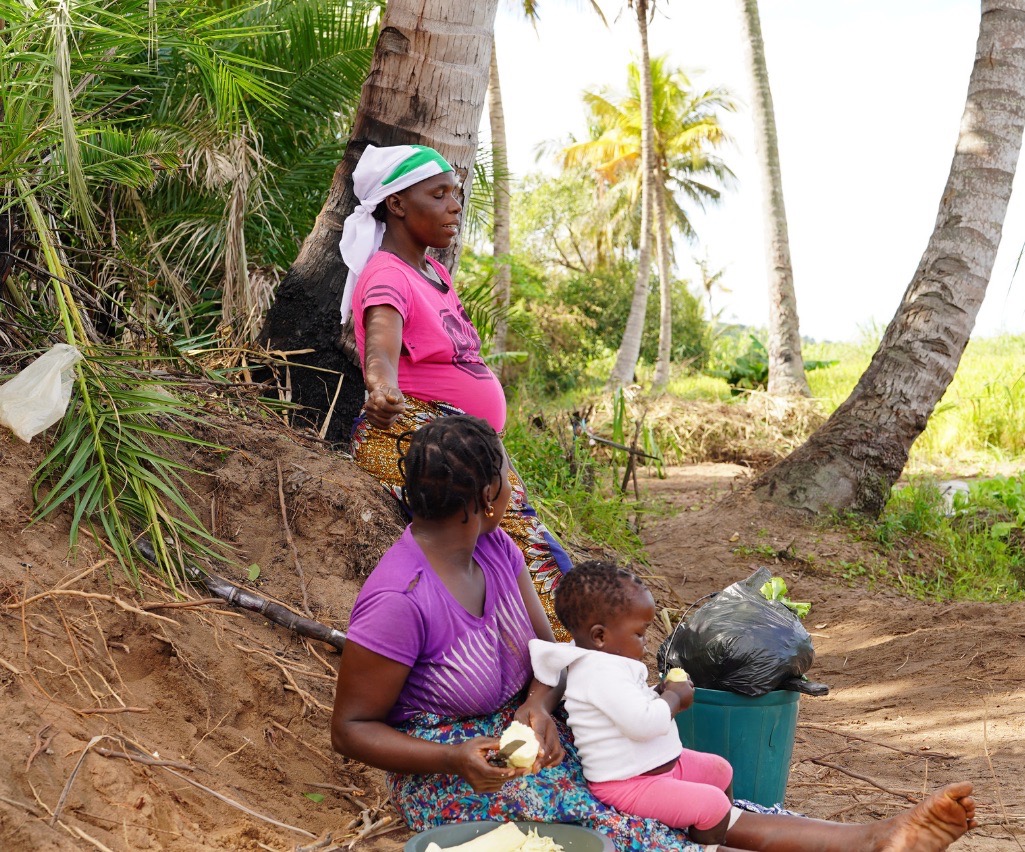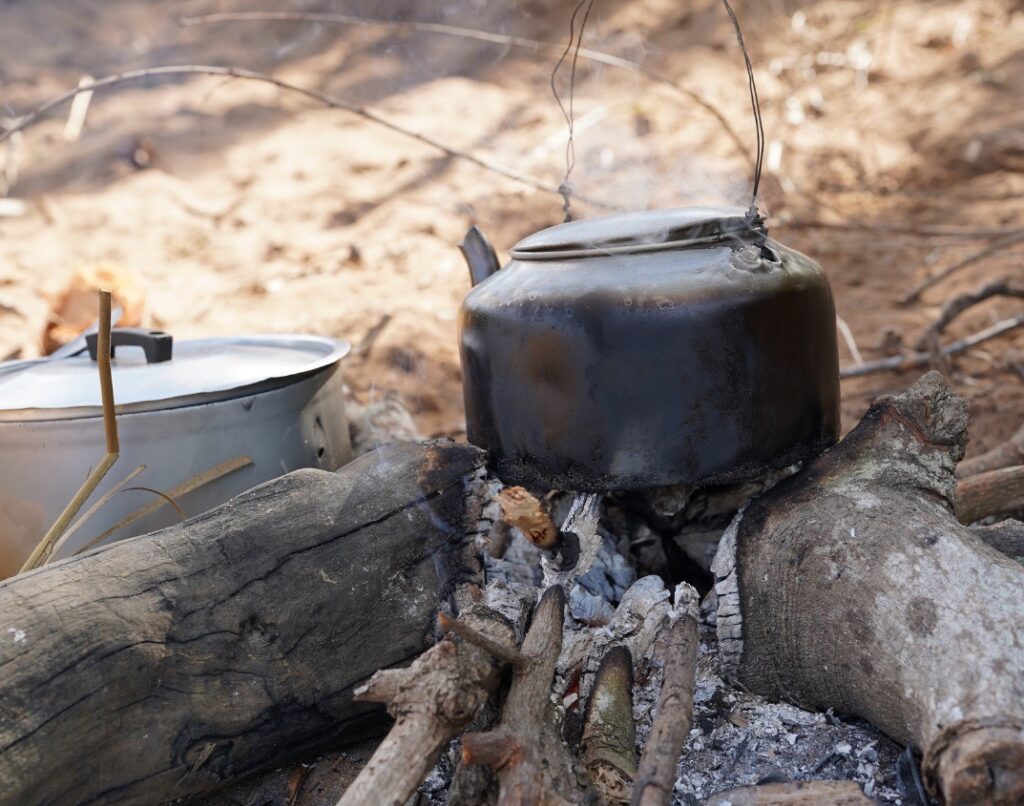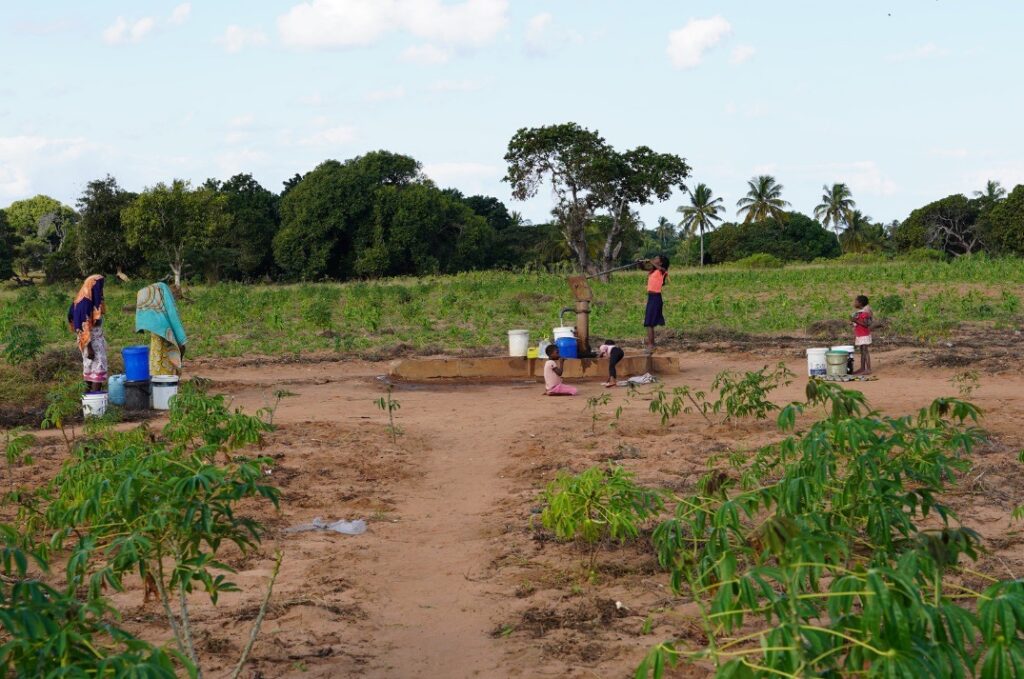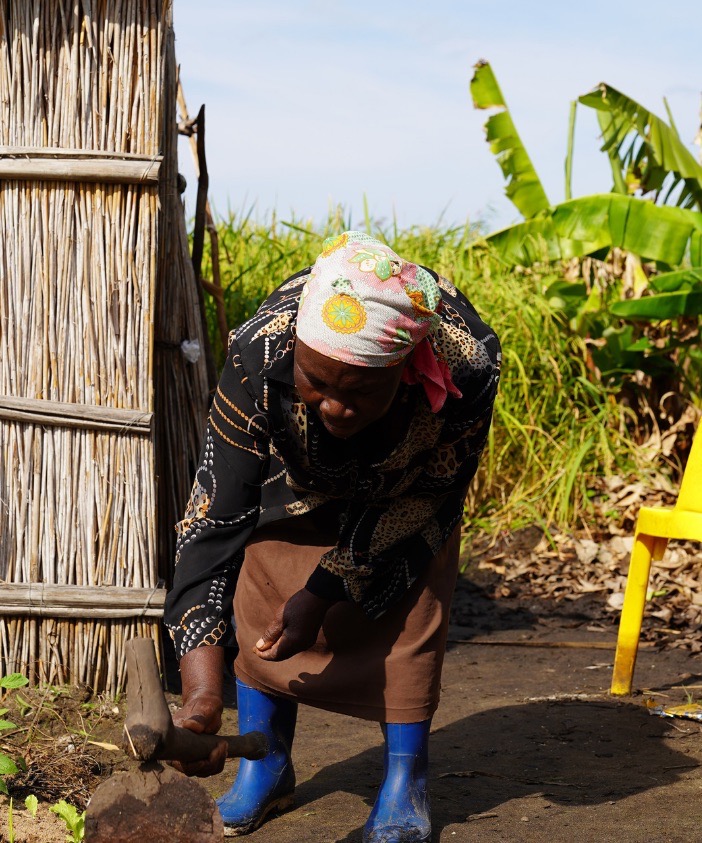Inhambane
Interview with Elisane at her field by the Lake Canda
Here in my filed, I plant rice, but we leave a place where we can plant cabbage, lettuce, onions. After the harvest, we sell, and what we do to buy soap to help us in poverty because we don’t have maize. We plant to help us in our stomach. Because we die of hunger here, for our stomach, we don’t have anything to eat or so little. We just stay and live off our poverty here in the fields (Mtchogoni).

Since we don’t eat, we are very hungry, Father, in this country. If you meet us in the summertime with a lot of heat, you might even think this person would die. We take away the “reserve” (from the body), and we get skinny.
From growing rice and we do put lettuce, and cabbage. If you have the strength to cultivate and plant, you could be able to grow maize. They also grow with this manure that we put in. Then you harvest the maize and take it to the store to mill it. Then we come to eat it.
From morning until night, we come here. I haven’t studied, but I believe between 6 a.m. when the sun comes up, we come here. Because when the birds come in the morning, we are already here to scare the birds away. Because there are many now, the rice is ripe smells, and many birds fill up. Beat the birds they fall. You can fill this basin called (name of birds) MACHOWE.

We never did because we didn’t teach ourselves that we have to sing, and in happy encounters, we sing, the song we sing;
MAME U WAFHA NGUDZALA MTINI HIPHA KUDIMBA,
VANANA VANGU VA DAWA NGUDYALA MUTCHOGONI HIPHA KUDIMBA.
So, we sing while cultivating and playing.
VANANA VANGU VA DAWA NGUDYALA MTINI NIPHA KUDIMBA. MTCHOGONI MU NODAWA NGUMU DZAWA MBASSI NIPHA KUTSAMBA. VANANA VANGU VA NDARERA MAMA KUDZALA NIPHA KUDIMBA MTCHOGONI HITCHI DARERA MAMA KUMU DZAU HIPHA KUTSAMBA SALADA HITCHI DIMA MAEI MTCHOGONE HI NLHA KUTSAMBA
We live in this poverty that we are in, and so we sing.
We don’t compose these songs (but we sing) because we’re feeling good, not feeling with our lungs prone to tingling. when I find cabbage I cook, Because it opens up in our lungs prone to cultivating, when I find cabbage I cook, sweet potato leaves, pumpkin leaves, we cook when we find them and when it’s quiet with birds, we look for the
kakana to cook.

The root grows that is the lettuce that we give from these seeds that we plant and then sell and eat as well. Now it is the season of rice. We sowed in February and January. It is now drying up. Then we will cut it in June. What we have been doing, we clean the land and sow the rice.
When the land is ready, we pierce the soil with a flat stick to open a hole and put the seed in it when we sow the rice. It is not to sell, but rather to share among families, because if, one day, you wouldn’t have food, you would have family help to sow in your fields.

I come alone since my children are grown up. I come here to chase the birds away as my partner has passed away. Because of my old age, I sow and managed to fill one and a half sacks, one sieve and one can. If you are very lucky and the rice got rain, even two bags you can. So, we work to make our own small space. Those who sow in large spaces get the rice. I sow very little because of my old age. I suffer from legs even now, but I cultivate because of poverty.
I know that since December, January and the time we sow Moleque we cut, it looks like peanuts. We sow then in late January and February, we clean the plot and put in the ground and start sowing. Those are the months that we work on them.
Even on other days, we eat our rice without thinking that we’ll get our rice next season next year. This year we will cut the rice now, and we don’t leave the same rice for next year.

Interview with a farmer and mat maker
Filmão Xandreque Nzango
I’m 46 years old. I was born here in Nzanguine. My two older brothers have died. My children are alive. I have one sister. Another one has passed away. I have a wife, I live with her here at home, but at the moment she’s in the field. I can’t remember the year we were married, but we’ve grown old together, it’s been a long time. But that’s because I’ve lost my papers. We’ve been together for a long time, until we got older. We didn’t get married, we just stayed together. Maybe in life we’ll get married, anything is possible. My children who live here with me are only two men. The girl is at home.
When you go to the fields to work, what time do you come in?
When I go to the fields, I leave home at 5 a.m. and work from 5 a.m., 6 a.m., 7 a.m. until 10 a.m. I can be back home. But some days I stay until the end of the day.
What do you do in the morning when you wake up?
I wash my face, brush my teeth with mulala (a toothbrush made from a traditional plant called mohangula) and then I go to the field to work. I take my lunch box and eat at 6 am. 10 am I return home.
Who cooks for you?
My wife, who’s in the field.
What do your wife and daughters do?
They farm. I gave them a field, they split it between them and they work it. But we adults also have our own space where we farm. So we usually have a rope separating the fields.
Do you also cook for your family?
Yes, I also weed and we all eat here at home. I’ve even built a house for them here in my own space. Because they belong here and I don’t want to be separated from them. Most of the time, they’re the ones who cook for me.
Do you use charcoal or wood when you cook?
We use firewood and cut it with a saw. We burn it to make our food and eat it.
Who carries the firewood you use?
My daughters picked it up. When we have money, we hire a van to carry it. Sometimes we use our heads and take them home. As you can see, we have a lot of firewood here.
What do you grow?
We grow rice, cabbage, salad and all kinds of plants. We also grow bananas so that we can live. The most common is salad and cabbage. That’s what keeps us going. We also grow onions. Everything. Rice is also the main food we grow. I, who am an expert, divide my fields. They’re
giving us a good harvest so we can feed ourselves. So I planted the fields in two places, I worked hard. We also plant sugar cane.
Do you have planting seasons? For example, when to plant peanuts or rice or cassava?
Yes, there are seasons, but sometimes we fall into the trap of rain that doesn’t fall and I find it complicated. You can plant things and then find out that the crop didn’t yield anything, the seeds didn’t produce. Here we don’t have medicines for the crops. You need money for that. To buy these medicines. You can’t have a good harvest if you’re not putting medicines on the food. We grew without using these medicines on the groundnuts. We’re surprised. This is Satan’s answer that has arrived. But we’re still planting.
In your history, didn’t people use these medicines in the past?
No, we grew old without knowing that we had to put chemicals in our food. Now that we’re old, we know, even those children didn’t know, only now do they know, those children grew up in poverty, they didn’t have food. When we have money, we apply these chemicals, but when we don’t, what are we going to do? Nobody is going to give it to you for free. We suffer a lot.
Is the rain the same as before? Does it rain in the same way?
It only rains for a moment. It’s not as hard as it used to be. Sometimes we go a month without seeing any rain. Maybe it will rain over time.
Why has it changed from not raining at the right times?
I don’t know, I’m just surprised. Even I’m left with questions. We don’t know what’s happening. Maybe you know why it’s happening. You’ll tell us.
These fields you have, do you look after them yourself or is the whole family involved?
My whole family is working there. The three children and my daughter-in-law. I made space for them because I’m old. I just look at them and say “do it like this”, I also help them in any way I can. For example, I buy the hoe sticks, I teach them and they go and cut. When we cut the rice, we cut it together. Then we take it home and eat it.
What do you collect, eat or sell?
We keep it inside our houses, cook it and eat it. We don’t sell it. If you want it, we’ll discuss it and I’ll sell it to you. I want money too. But in these difficult times I have to save it. Those who don’t have a field have to buy rice when they want it, but we who have a field eat what we produce.
Outside of farming, do you have any other activities?
Yes, I sew mats and sell them. And with that money I buy salt and sugar. But these years it’s not easy to have that kind of money or for anyone to buy mats. We have plenty of these things to make mats (timbusi: straw). People see the mats but don’t have the money to buy them. We’re suffering. The mats are in there, nobody has the money to buy mats. When you say, “Give me some money and I’ll clear your field or cultivate it for you”, the person doesn’t accept. When we ask to borrow money, the person denies it, we suffer a lot.
Do you have any other way of surviving besides that?
No, just farming. I plant manioc and corn and you’ll always find me in the fields. I’m old, you see, but I work. I have to live and help my family. That’s what I do.
Do you have rules here in the camp about how to explore the forest?
No, we don’t have many rules here. Our leaders also feel for us. They know that the people need this bush for their survival. They also have these problems; they suffer. The leaders are like us. There’s no law that says you can’t do that. We have harmony.
If I want to buy land and I’m not from here, what do I have to do?
You come, we talk, and you tell me, Grandpa, I want to build, we look for someone, we make a request, we talk to the person, we have sincere conversations, we say this is my son and we need a space to build. But first we talk to the owner of the space. Even when there’s a woman whose husband has passed away, we talk to her and say “there are people interested in the space, can you make it easier”? Then we say “it’s our son who was away and has come home and wants to build”. That’s accepted.
For the younger ones, how do you get them to build their houses?
If it’s people like my grandchildren, we ask someone who has a lot of land, we talk, we understand each other. If it’s to buy, we buy with money. He receives it and gives you the space to build. We do everything in harmony.
In 1958 there were hunger problems, people died of hunger. Did you experience that?
I saw it, we were all going to die because of the heat, there was no rain, we had no water to live on. Then when the boreholes were installed in the area, that helped us. And at that time we didn’t have any water and there were a lot of us. This whole country, here in this area, Nzango, Nhamahango, Uphemba. People had to go to Puquene to fetch water. We traveled many distances. Sometimes there was no more water on the ground because there were so many of us going to fetch water. It was a lot of people. That happened and I saw it.
In 1970 there were flood problems and many animals died. Did you witness that moment?
Yes, I saw it. A lot of cattle died there and we people died too. Then it seemed that someone was killing us, whereas it is God himself who is against us, who is killing us, because we have no food, we have no way of living, the children were already learning to steal because of hunger. But it’s
not possible to live like this. We also had to steal manioc from other people in order to live. But that’s over now. That time has passed. We do it with our own hands. Even I learned to cultivate out of hunger. Otherwise we would have died with my family. And here we are living.
In 1972 they had drought problems, there were no cattle or game, how did they survive?
Those were very difficult times. What happened was that the cow and goat farmers and we people had a lot of problems. I started planting coconut trees because of the famine. I’d go and get these coconut trees in Macone and Mambine, carry a bag of coconuts on my head and come and plant them. I have many coconut trees because of my expertise. I’ve never bought coconuts, I plant them myself.
In 1983 there was also a calamity, there was no rain and no food, how did you adapt without help from the government?
The problem with our government is that when they receive support, they distribute it among themselves and give us nothing. So this creates a disagreement between us and them. Then they
would call us to meetings to tell us about this support, but they wouldn’t give it to us. They would say “the support is over”. But we’d ask, “Who did you give it to?”. So when they called us, I didn’t go. Because I was tired of hunger. They came to the meeting with full bellies. That’s why we got tired of their lies. That’s why we live off what we grow. We plant manioc and eat manioc because if we have to buy it, where are we going to get the money from? And if we ask them to point out what we owe, then they just point, point and those thoughts of debt can get you killed. So we just stay here.
In 1985, during the civil war, people suffered from hunger, animals were killed… how did you adapt to these situations?
I used to go to the field. Even in the field there’s a pit that we dug for water. I was the one who dug that pit so that we could have water to water the plants. To this day I’m no longer the leader, I’m the chief of this area, I’m the chief of that pit that was created to have water. Even those South Africans know that I own that pit. I refused to let them put the engine in. Because that was my space. They wanted to bribe me but I didn’t accept. If I don’t, I’m going to kill the population, because they’re going to take the water from our fields to their beach. I’m going to take people’s strength so that I can make money. They got angry with me and said I was very clever.
Do you remember the civil war?
Yes, I was arrested by armed bandits. They caught me cultivating and took me away and I ran, they shot at me, but I said “patience, I have to run” and went into those banana trees. They arrested a lot of people, people who never came back. Many people thought I had died. My family, I had left in other forests far away. My family thought I was dead, but they didn’t catch me. I witnessed it.
In 1987 there was a law that you couldn’t sell your land, did that also affect you here in the countryside?
We never sold the land, we only offered it, so this law didn’t change anything in our lives. Because the law says you can’t sell the land. Those who don’t have space to cultivate and survive off the land. There was a time when we did this secretly back home. We didn’t know there were these deals. There on the beach, in the fields, selling to each other is forbidden, we only shared the places that belonged to us. But nowadays people don’t have a good heart.
Is it possible that there’s no water in the fields?
Yes, it’s possible. If it doesn’t rain very often, there’s no water in the fields. The great medicine is when it rains. Now we irrigate with water but it doesn’t look good, when it rains it’s better.
When it doesn’t rain, what do you do?
We just suffer or the seeds die. When it doesn’t rain with that abundance. For example, we don’t have salad at the moment, those land grooves had a lot of water and that influenced the soil so that it didn’t give good seeds. So the soil ended up spoiling to this day.
Do you try to communicate with God?
Yes, we talk, but God isn’t there. But we pray a lot. I don’t sleep without praying in my house, I get down on my knees and say: “God help us”. So I’m alive, but in reality I pray to my protector, talk to heaven? Forget it! That’s not possible. When heaven decides that rain is going to fall, the rain will fall naturally. If we had the keys to open the sky, we would open the sky so that the rain would fall. For example, now that it’s raining, it’s worth it.
When it rains a lot, doesn’t it ruin your agricultural production?
Yes, the seeds spoil, they go into those furrows and so there’s no production because they get buried with the water in the soil. But when it rains normally, everything is fine.
Would you like to leave the country and live in the city?
No, I wouldn’t like to go to the city and leave my family. Because when I die, who will bury me? They’ll kill me there and I’ll be like nobody. I know I have family in the city, I can go visit them and come back. Here they know where I am.
Do you have cattle?
Yes, I have oxen.
How many?
I don’t know how many I have because I’ve been lending them to people and they’ve been reproducing, so I don’t know.
Who taught you how to make mats?
Poverty teaches us everything. This is very old. This is my second base. So I buy wood. I don’t send someone to make the mats, I make them myself. This base I take to the field and I can make my mats there in the field while I’m sitting down.
Do you teach your children?
They’re here. They don’t even know how to pull that straw, but they ask for mats all the time. I’ll show you those straws soon. These children don’t want to learn, they refuse. But my daughter- in-law does it, she does it alone and she has her machines.
Do you teach women to make mats?
Yes, the women are here. They make mats. But my grandchildren are lazy. I always tell them: “learn to make mats so you can survive” but they refuse. So you can’t insist, it doesn’t work like that. As for music, he sings religious songs from the Zione church.
